Unit 1 A land of diversity Learning about language
文档属性
| 名称 | Unit 1 A land of diversity Learning about language |
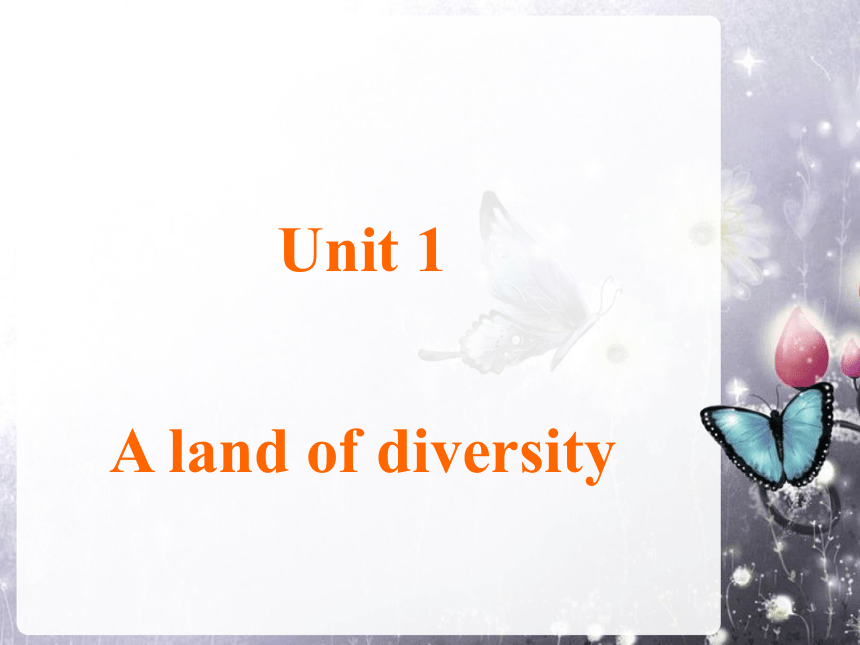
|
|
| 格式 | rar | ||
| 文件大小 | 850.6KB | ||
| 资源类型 | 教案 | ||
| 版本资源 | 人教版(新课程标准) | ||
| 科目 | 英语 | ||
| 更新时间 | 2010-08-03 00:00:00 | ||
图片预览

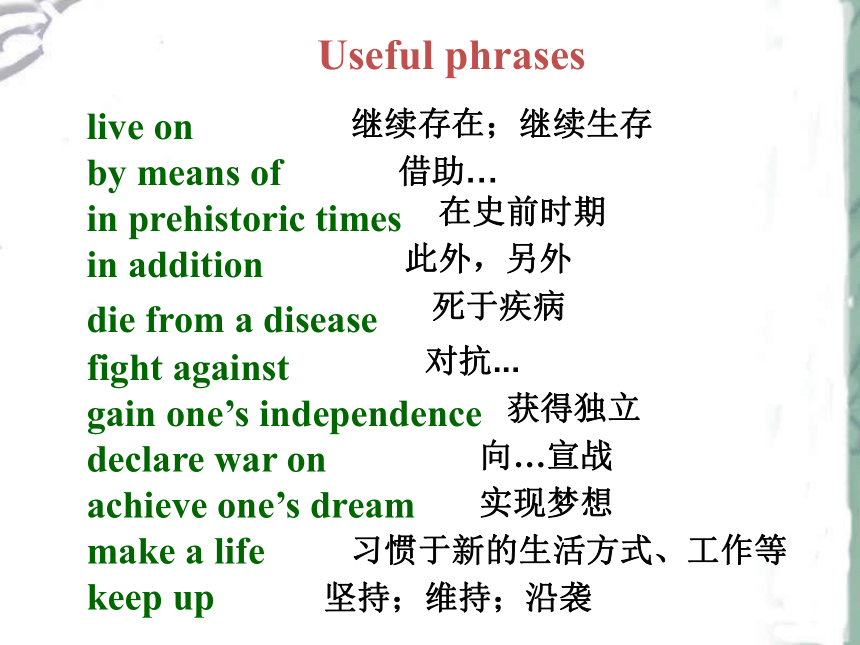
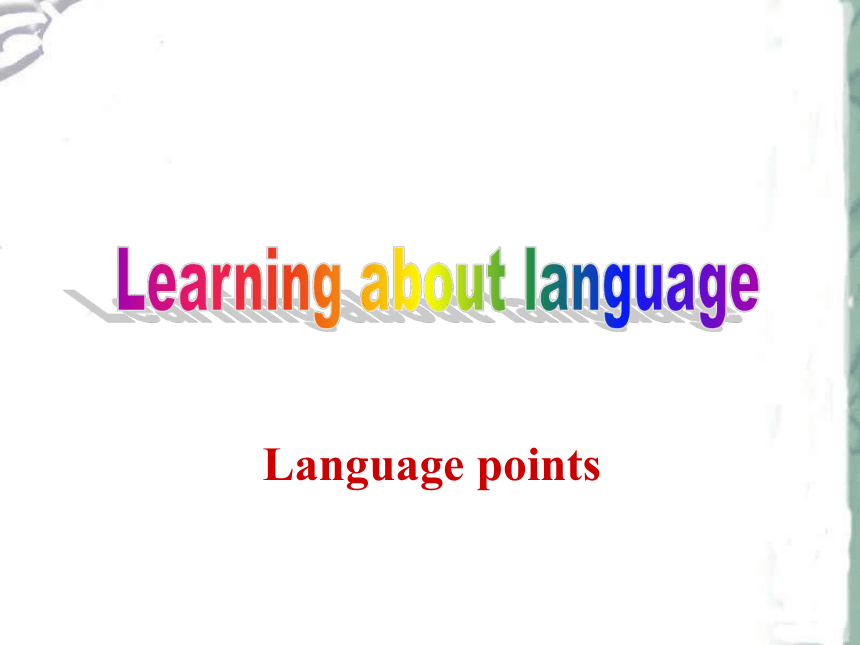
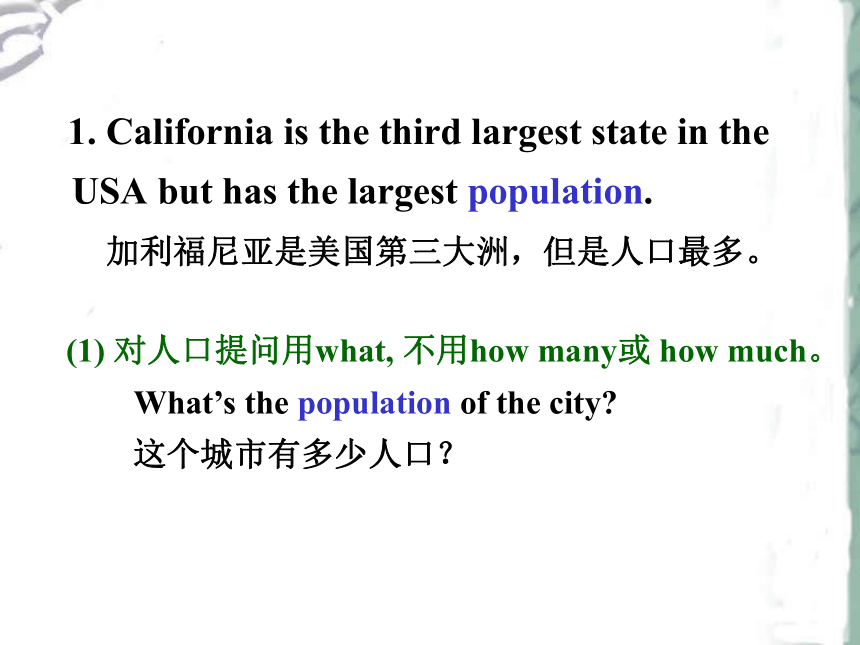

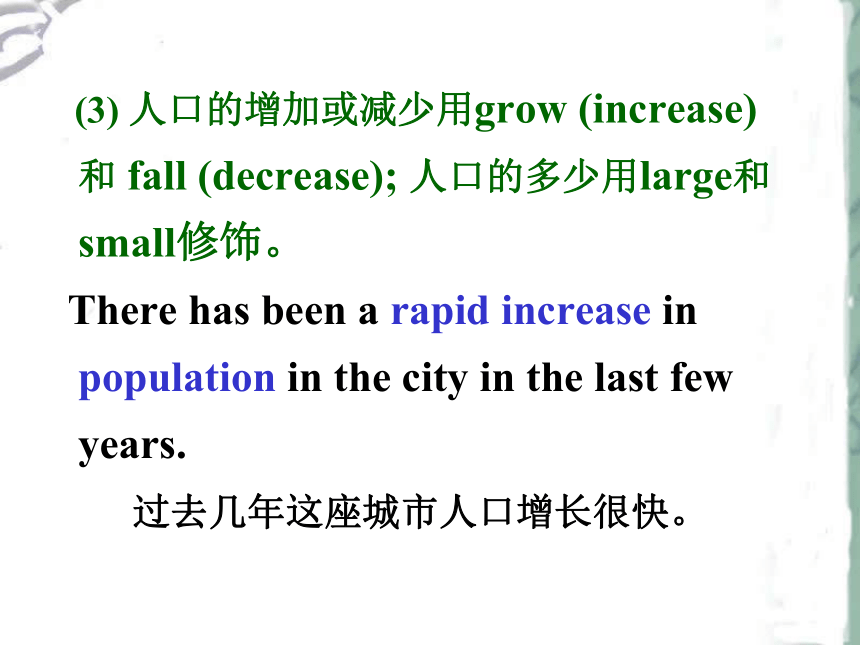
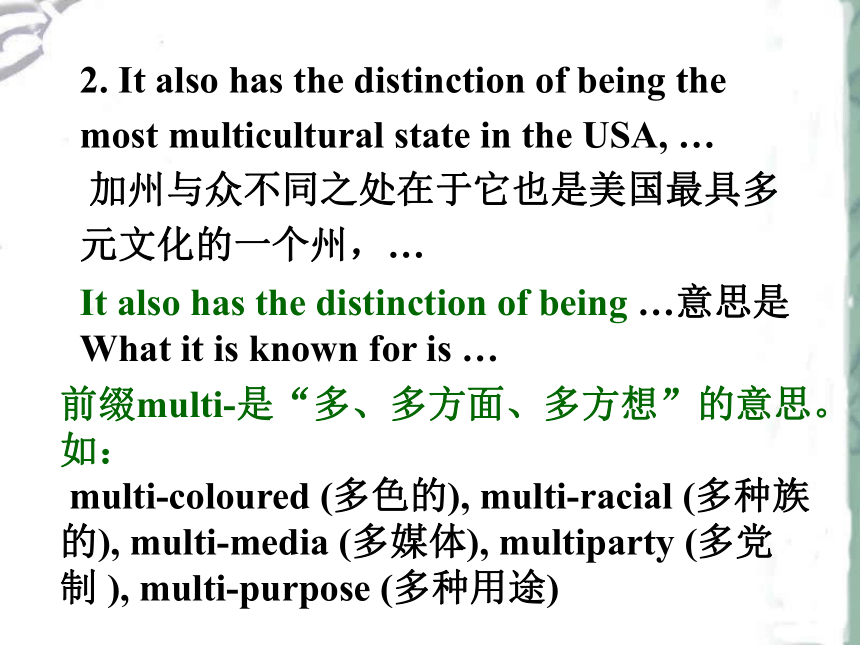
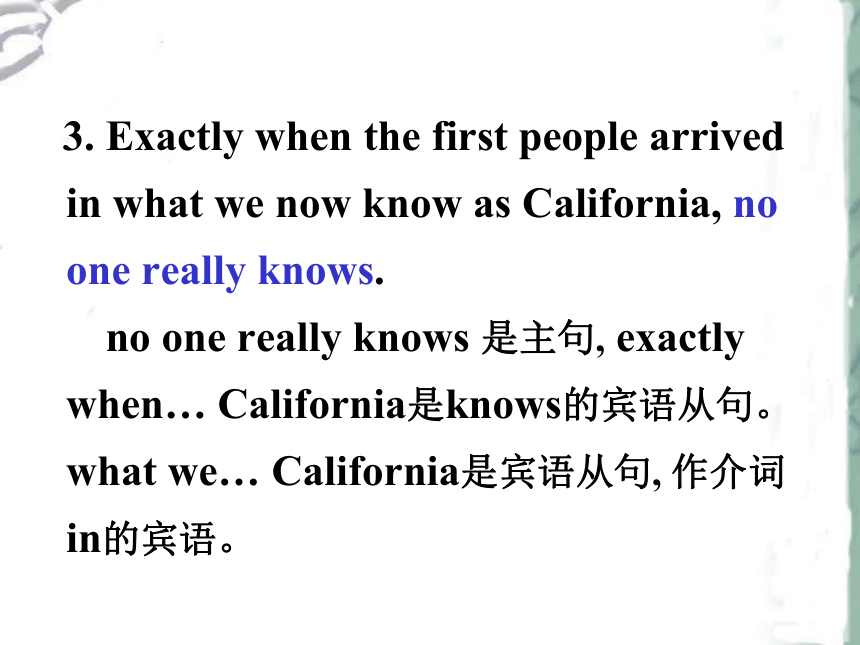
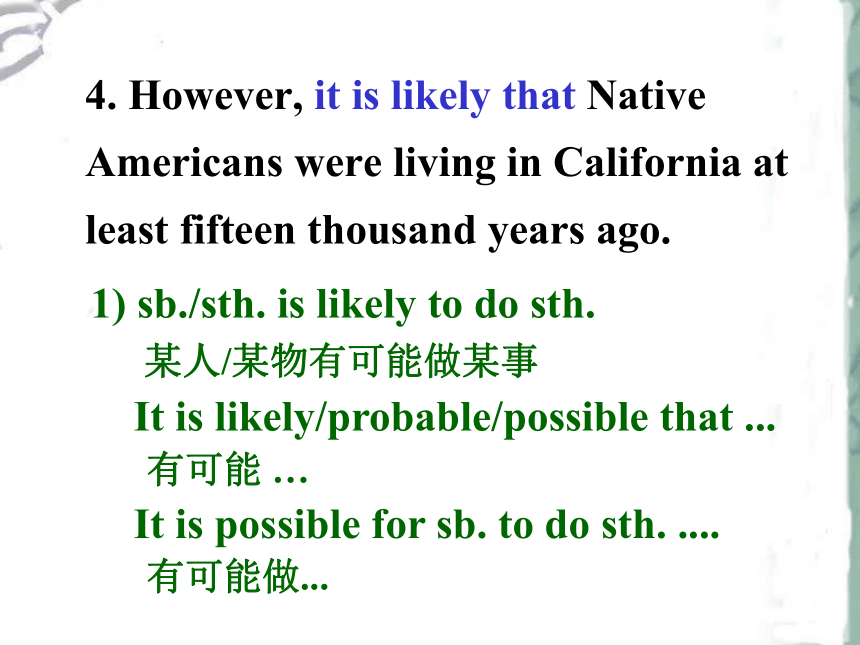
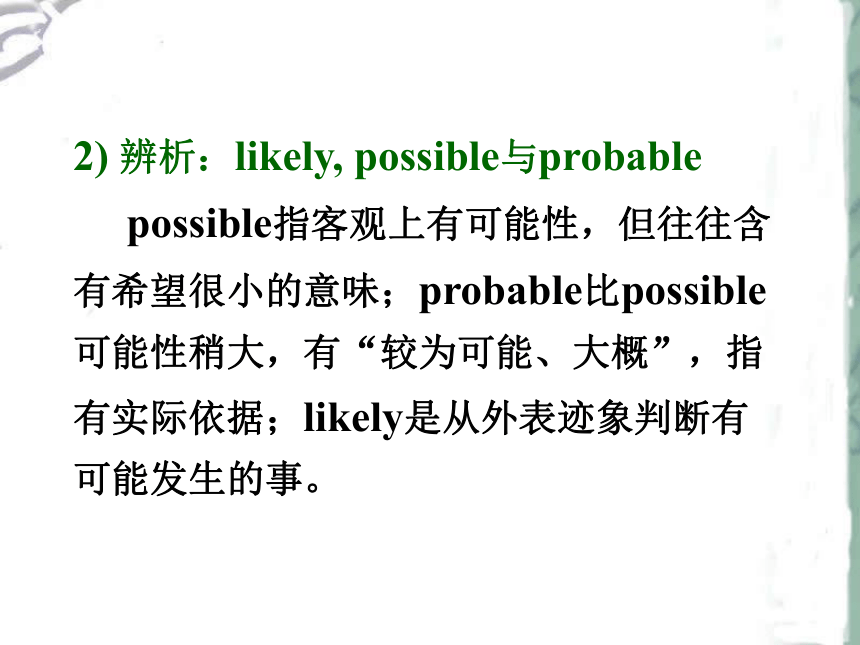
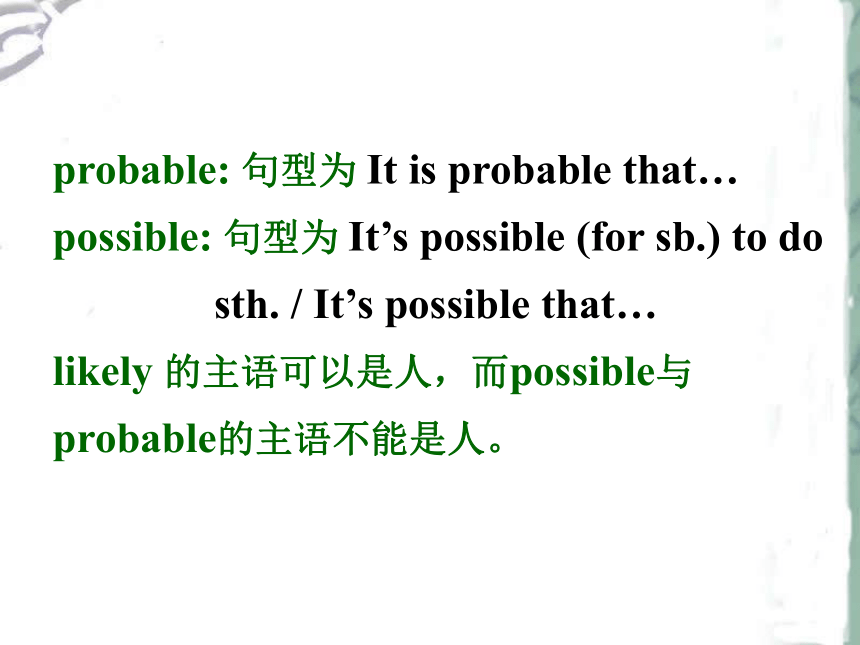

文档简介
课件40张PPT。Unit 1
A land of diversityUseful phraseslive on
by means of
in prehistoric times
in addition
die from a disease
fight against
gain one’s independence
declare war on
achieve one’s dream
make a life
keep up继续存在;继续生存借助…在史前时期 此外,另外死于疾病对抗...获得独立向…宣战 实现梦想习惯于新的生活方式、工作等 坚持;维持;沿袭Learning about languageLanguage points 1. California is the third largest state in the USA but has the largest population.
加利福尼亚是美国第三大洲,但是人口最多。(1) 对人口提问用what, 不用how many或 how much。
What’s the population of the city?
这个城市有多少人口? (2) population 作主语时用单数,但前有分数、小数或百分数时,谓语动词用复数。
The population of China is larger than that of America.
中国人口比美国人口多。
80% of the population are farmers.
百分之80的人口是农民。 (3) 人口的增加或减少用grow (increase) 和 fall (decrease); 人口的多少用large和small修饰。
There has been a rapid increase in population in the city in the last few years.
过去几年这座城市人口增长很快。2. It also has the distinction of being the most multicultural state in the USA, …
加州与众不同之处在于它也是美国最具多元文化的一个州,…It also has the distinction of being …意思是What it is known for is …前缀multi-是“多、多方面、多方想”的意思。如:
multi-coloured (多色的), multi-racial (多种族的), multi-media (多媒体), multiparty (多党制 ), multi-purpose (多种用途) 3. Exactly when the first people arrived in what we now know as California, no one really knows.
no one really knows 是主句, exactly when… California是knows的宾语从句。what we… California是宾语从句, 作介词in的宾语。 4. However, it is likely that Native Americans were living in California at least fifteen thousand years ago. 1) sb./sth. is likely to do sth.
某人/某物有可能做某事
It is likely/probable/possible that ...
有可能 …
It is possible for sb. to do sth. ....
有可能做...2) 辨析:likely, possible与probable
possible指客观上有可能性,但往往含有希望很小的意味;probable比possible可能性稍大,有“较为可能、大概”,指有实际依据;likely是从外表迹象判断有可能发生的事。probable: 句型为 It is probable that…
possible: 句型为 It’s possible (for sb.) to do
sth. / It’s possible that…
likely?的主语可以是人,而possible与probable的主语不能是人。?Is?he?likely?to?win??
他有可能获胜吗??
It’s possible, though not probable, that he will come tomorrow.
他明天可能来, 但也不一定准来。 5. In the 16th century, after the arrival of Europeans, the native people suffered greatly.vi. 受痛苦;受损害
vt. 遭受;忍受suffer 辨析:suffer与suffer from
suffer (vt.) 和suffer from的区别:suffer 指一般的损害、痛苦等等, 其宾语为pain, loss, grief, insult, punishment, wrong, hardship, injustice, discouragement, disappointment, setback (挫折),但suffer from表示遭受战争,自然灾害带来的苦难及患病之意。 suffer the result / heavy losses / injuries承受结果/遭受大损失/负伤
suffer from headache / illness / war / the flood
遭受头痛/疾病的困扰/战争/洪水 辨析:die from, die of
die of 死于疾病、饥饿等, 多指内部原因。
die from 常用死于创伤、交通事故, 多指外部未知原因。6. In addition, many died from the diseases brought by Europeans. 7. Spanish soldiers first arrived in South America in the early 16th century, when they fought against the native people and took their land.
16世纪早期, 西班牙士兵到达南美洲, 这时同土著人作斗争并占领这片土地。
fight for
“为事业, 自由, 真理, 权利等而斗争(战斗)”
fight against (可用with) the enemy
“为反对……而斗争”;接人和国家名词,
意思是“与……战斗”
fight with sb. 也可表示与某人并肩作战辨析: fight against, fight for与fight with 8. Of the first Spanish to go to California, the majority were religious men, whose ministry was to teach the Catholic religion to the natives.1)句中Spanish前面有序数词限定成分,故其后用不定式定语形式。
She was the first woman to win the Nobel Prize.the majority of后可用单数名词, 也可用复数名词, 谓语动词的数与of 后面的名词相一致。
The majority of people prefer peace to war.
The majority of the damage is easy to repair. 9. Some died or returned home, but most remained in California to make a life for themselves despite great hardship.1) remain用作不及物动词, 意为 “剩下、留下、呆在”, 相当于stay。When?the?others?had?gone,?Joan?remained?
(=stayed)?to?clean?the?room.?
stay通常指在某地呆一段时间而不离开, 暂时住在某地, 尤指宾客逗留;而remain指别人已经走了,而某人仍在原地。1). He stayed at the hotel for three days.
2). Only?a?few?leaves?remained?
(=were?still)?on?the?tree.?
3). The?Smiths?remained?there?all?
through?the?year.??
4).The?soldiers?were?ordered?to?remain?
where?they?were.??注意:?“呆在那里”可以说remain?/ stay?
there,?但“呆在家里”只能stay?(at)?home。remain作连系动词, 意为 “一直保持,仍然处于某种状态中”,?后可接多种成分作表语。1)?接名词作表语
Peter?became?a?manager?but?John?
remained?a?worker.?
Their?marriage?remains?a?secret.??2)?接形容词作表语 Whatever?great?progress?you?have?made,?you?should?remain?modest.??
The?shop?remains?open?until?11?at?night.??3)?接过去分词作表语, 表示主语所处的状态或已经发生的被动动作。如:
They?never?remained?satisfied?
with?their?successes.??(表主语所处的状态)
They?remained?locked?in?the?room.??
(已经发生的被动动作)4) 接现在分词作表语,表示正在进行的主动动作。如:
The?guests?came?in,?but?she?
remained?sitting?at?the?desk?reading.
(正在进行的主动动作)
They?remained?listening.??5)?接不定式作表语, 表示将来的动作。如:
This?remains?to?be?proved.?(将来被动动作)
Whether?it?will?do?us?good?remains?to?be?seen.?6)?接介词短语作表语
I?have?remained?in?touch?with?the?Greens?for?more?than?10?years.??
He?had?to?remain?in?hospital?until?he?was?better.??注意:?
①?remain?作名词时,表示“剩余物”, 一般用其复数形式。如:
The?remains?of?a?meal?can?be?given?to?a?pig.?
They?found?some?remains?of?the?Tang?Dynasty.?②?remaining?是形容词, 意为“剩余的”,常作前置定语; 而left则只能作后置定语。如:
There?are?only?5?books?left.?
He?bought?me?a?gift?with?the?
remaining?money.?Learning about languageRevising useful structures从句一律保持陈述句语序。 主语从句
Subject clause
宾语从句
Object clause
表语从句
Predicative clause
同位语从句
Appositive clause名词从句名词性从句基本结构:
引导词 + 从句(陈述句语序)
相当于一个名词成分, 在句中作主语、 宾语、表语或同位语。What I want to do is to go home immediately.
I said that I want to go home immediately.
My hope is that I want to home immediately.
The fact that the earth goes around the sun is acceptable now.主语从句宾语从句表语从句同位语从句1. 主语从句:从句在句中充当主语成分2. 宾语从句:从句在句中充当宾语成分( 可以作谓语动词、介词、不定式等非谓语动词的宾语)3. 表语从句:从句在句中充当表语成分,一般放在连系动词之后。4. 同位语从句:从句在句中充当同位语成分,其一般跟在一些抽象名词(idea, belief, fact, truth, problem, news等)后面, 对名词作进一步解释说明。注意:
suggest, advise, order, command, insist, require, request等动词常接含虚拟语气的宾语从句: should + do。
动词wish 后的宾语从句也用虚拟语气。 I wish I were a bird. I wish that I had met him yesterday. Exercise
1. She received the message ___ he would come by plane.
A. that B. which C. what D. when
2. Energy is ___ makes things work.
A. what B. something C. anything D. that
3. Our city has changed a lot, and now it is quite different from __ a few years ago.
A. what it used to be B. that it used to be
C.which it used to be D. what was itAAA4. He has given us a suggestion ____ we should buy a cottage in the country, with the money we have saved. A. when B. where C. what D. that
5. After five hours’ drive, they reached ____ they thought was the place they’d been dreaming of. A. that B. where C. which D. whatDD6. It is no longer a question now ___ man can land on the moon. A. that B. which C. whether D. what
7. She is pleased with ____ you have given her and all that you have told her. A. that B. what C. why D. whichAB8. Father made a promise ____ I passed the exam, he would buy me a bicycle. A. that B. if C. whether D. that if
9. ____ surprised me most was that she didn’t even know ____ the difference between the two lies. A. What, where B. What, what C. That, where D. That, whatDA10. Sometimes we are asked ___ we think the likely result of an action will be. A. that B. what C. which D. whether
11. Nobody knows ____ he mentioned that at the meeting. A. that B. why C. what D. whereBB12. There is no doubt ____ my friend was not important to them all. A. that B. whether C. if D. why
13. I have no idea ____ they will visit our school; we have got everything ready. A. how B. when C. that D. whyBARevise the language points in reading text.
Finish exercises 1-4 on page 5.
Finish exercises 1-4 on page 48-49 in workbook. Homework
A land of diversityUseful phraseslive on
by means of
in prehistoric times
in addition
die from a disease
fight against
gain one’s independence
declare war on
achieve one’s dream
make a life
keep up继续存在;继续生存借助…在史前时期 此外,另外死于疾病对抗...获得独立向…宣战 实现梦想习惯于新的生活方式、工作等 坚持;维持;沿袭Learning about languageLanguage points 1. California is the third largest state in the USA but has the largest population.
加利福尼亚是美国第三大洲,但是人口最多。(1) 对人口提问用what, 不用how many或 how much。
What’s the population of the city?
这个城市有多少人口? (2) population 作主语时用单数,但前有分数、小数或百分数时,谓语动词用复数。
The population of China is larger than that of America.
中国人口比美国人口多。
80% of the population are farmers.
百分之80的人口是农民。 (3) 人口的增加或减少用grow (increase) 和 fall (decrease); 人口的多少用large和small修饰。
There has been a rapid increase in population in the city in the last few years.
过去几年这座城市人口增长很快。2. It also has the distinction of being the most multicultural state in the USA, …
加州与众不同之处在于它也是美国最具多元文化的一个州,…It also has the distinction of being …意思是What it is known for is …前缀multi-是“多、多方面、多方想”的意思。如:
multi-coloured (多色的), multi-racial (多种族的), multi-media (多媒体), multiparty (多党制 ), multi-purpose (多种用途) 3. Exactly when the first people arrived in what we now know as California, no one really knows.
no one really knows 是主句, exactly when… California是knows的宾语从句。what we… California是宾语从句, 作介词in的宾语。 4. However, it is likely that Native Americans were living in California at least fifteen thousand years ago. 1) sb./sth. is likely to do sth.
某人/某物有可能做某事
It is likely/probable/possible that ...
有可能 …
It is possible for sb. to do sth. ....
有可能做...2) 辨析:likely, possible与probable
possible指客观上有可能性,但往往含有希望很小的意味;probable比possible可能性稍大,有“较为可能、大概”,指有实际依据;likely是从外表迹象判断有可能发生的事。probable: 句型为 It is probable that…
possible: 句型为 It’s possible (for sb.) to do
sth. / It’s possible that…
likely?的主语可以是人,而possible与probable的主语不能是人。?Is?he?likely?to?win??
他有可能获胜吗??
It’s possible, though not probable, that he will come tomorrow.
他明天可能来, 但也不一定准来。 5. In the 16th century, after the arrival of Europeans, the native people suffered greatly.vi. 受痛苦;受损害
vt. 遭受;忍受suffer 辨析:suffer与suffer from
suffer (vt.) 和suffer from的区别:suffer 指一般的损害、痛苦等等, 其宾语为pain, loss, grief, insult, punishment, wrong, hardship, injustice, discouragement, disappointment, setback (挫折),但suffer from表示遭受战争,自然灾害带来的苦难及患病之意。 suffer the result / heavy losses / injuries承受结果/遭受大损失/负伤
suffer from headache / illness / war / the flood
遭受头痛/疾病的困扰/战争/洪水 辨析:die from, die of
die of 死于疾病、饥饿等, 多指内部原因。
die from 常用死于创伤、交通事故, 多指外部未知原因。6. In addition, many died from the diseases brought by Europeans. 7. Spanish soldiers first arrived in South America in the early 16th century, when they fought against the native people and took their land.
16世纪早期, 西班牙士兵到达南美洲, 这时同土著人作斗争并占领这片土地。
fight for
“为事业, 自由, 真理, 权利等而斗争(战斗)”
fight against (可用with) the enemy
“为反对……而斗争”;接人和国家名词,
意思是“与……战斗”
fight with sb. 也可表示与某人并肩作战辨析: fight against, fight for与fight with 8. Of the first Spanish to go to California, the majority were religious men, whose ministry was to teach the Catholic religion to the natives.1)句中Spanish前面有序数词限定成分,故其后用不定式定语形式。
She was the first woman to win the Nobel Prize.the majority of后可用单数名词, 也可用复数名词, 谓语动词的数与of 后面的名词相一致。
The majority of people prefer peace to war.
The majority of the damage is easy to repair. 9. Some died or returned home, but most remained in California to make a life for themselves despite great hardship.1) remain用作不及物动词, 意为 “剩下、留下、呆在”, 相当于stay。When?the?others?had?gone,?Joan?remained?
(=stayed)?to?clean?the?room.?
stay通常指在某地呆一段时间而不离开, 暂时住在某地, 尤指宾客逗留;而remain指别人已经走了,而某人仍在原地。1). He stayed at the hotel for three days.
2). Only?a?few?leaves?remained?
(=were?still)?on?the?tree.?
3). The?Smiths?remained?there?all?
through?the?year.??
4).The?soldiers?were?ordered?to?remain?
where?they?were.??注意:?“呆在那里”可以说remain?/ stay?
there,?但“呆在家里”只能stay?(at)?home。remain作连系动词, 意为 “一直保持,仍然处于某种状态中”,?后可接多种成分作表语。1)?接名词作表语
Peter?became?a?manager?but?John?
remained?a?worker.?
Their?marriage?remains?a?secret.??2)?接形容词作表语 Whatever?great?progress?you?have?made,?you?should?remain?modest.??
The?shop?remains?open?until?11?at?night.??3)?接过去分词作表语, 表示主语所处的状态或已经发生的被动动作。如:
They?never?remained?satisfied?
with?their?successes.??(表主语所处的状态)
They?remained?locked?in?the?room.??
(已经发生的被动动作)4) 接现在分词作表语,表示正在进行的主动动作。如:
The?guests?came?in,?but?she?
remained?sitting?at?the?desk?reading.
(正在进行的主动动作)
They?remained?listening.??5)?接不定式作表语, 表示将来的动作。如:
This?remains?to?be?proved.?(将来被动动作)
Whether?it?will?do?us?good?remains?to?be?seen.?6)?接介词短语作表语
I?have?remained?in?touch?with?the?Greens?for?more?than?10?years.??
He?had?to?remain?in?hospital?until?he?was?better.??注意:?
①?remain?作名词时,表示“剩余物”, 一般用其复数形式。如:
The?remains?of?a?meal?can?be?given?to?a?pig.?
They?found?some?remains?of?the?Tang?Dynasty.?②?remaining?是形容词, 意为“剩余的”,常作前置定语; 而left则只能作后置定语。如:
There?are?only?5?books?left.?
He?bought?me?a?gift?with?the?
remaining?money.?Learning about languageRevising useful structures从句一律保持陈述句语序。 主语从句
Subject clause
宾语从句
Object clause
表语从句
Predicative clause
同位语从句
Appositive clause名词从句名词性从句基本结构:
引导词 + 从句(陈述句语序)
相当于一个名词成分, 在句中作主语、 宾语、表语或同位语。What I want to do is to go home immediately.
I said that I want to go home immediately.
My hope is that I want to home immediately.
The fact that the earth goes around the sun is acceptable now.主语从句宾语从句表语从句同位语从句1. 主语从句:从句在句中充当主语成分2. 宾语从句:从句在句中充当宾语成分( 可以作谓语动词、介词、不定式等非谓语动词的宾语)3. 表语从句:从句在句中充当表语成分,一般放在连系动词之后。4. 同位语从句:从句在句中充当同位语成分,其一般跟在一些抽象名词(idea, belief, fact, truth, problem, news等)后面, 对名词作进一步解释说明。注意:
suggest, advise, order, command, insist, require, request等动词常接含虚拟语气的宾语从句: should + do。
动词wish 后的宾语从句也用虚拟语气。 I wish I were a bird. I wish that I had met him yesterday. Exercise
1. She received the message ___ he would come by plane.
A. that B. which C. what D. when
2. Energy is ___ makes things work.
A. what B. something C. anything D. that
3. Our city has changed a lot, and now it is quite different from __ a few years ago.
A. what it used to be B. that it used to be
C.which it used to be D. what was itAAA4. He has given us a suggestion ____ we should buy a cottage in the country, with the money we have saved. A. when B. where C. what D. that
5. After five hours’ drive, they reached ____ they thought was the place they’d been dreaming of. A. that B. where C. which D. whatDD6. It is no longer a question now ___ man can land on the moon. A. that B. which C. whether D. what
7. She is pleased with ____ you have given her and all that you have told her. A. that B. what C. why D. whichAB8. Father made a promise ____ I passed the exam, he would buy me a bicycle. A. that B. if C. whether D. that if
9. ____ surprised me most was that she didn’t even know ____ the difference between the two lies. A. What, where B. What, what C. That, where D. That, whatDA10. Sometimes we are asked ___ we think the likely result of an action will be. A. that B. what C. which D. whether
11. Nobody knows ____ he mentioned that at the meeting. A. that B. why C. what D. whereBB12. There is no doubt ____ my friend was not important to them all. A. that B. whether C. if D. why
13. I have no idea ____ they will visit our school; we have got everything ready. A. how B. when C. that D. whyBARevise the language points in reading text.
Finish exercises 1-4 on page 5.
Finish exercises 1-4 on page 48-49 in workbook. Homework
